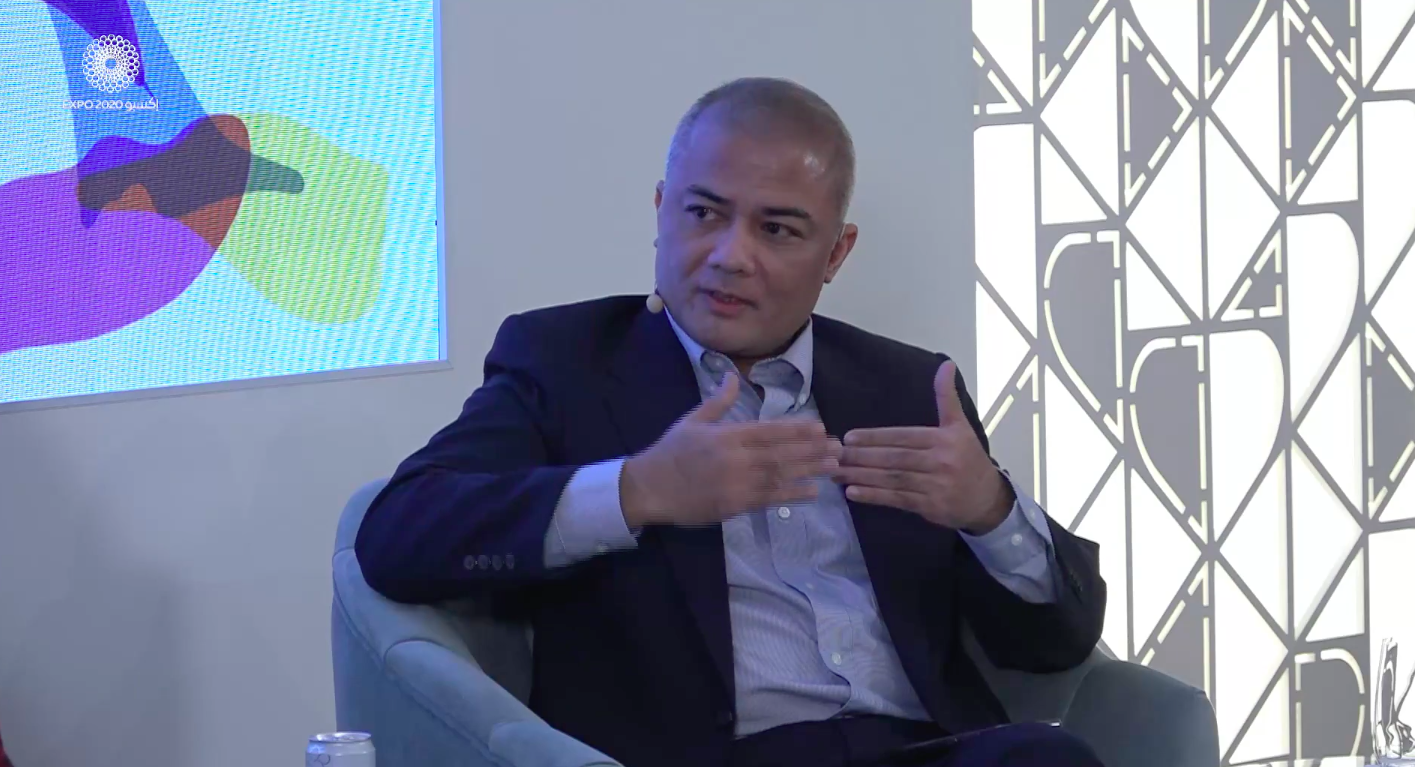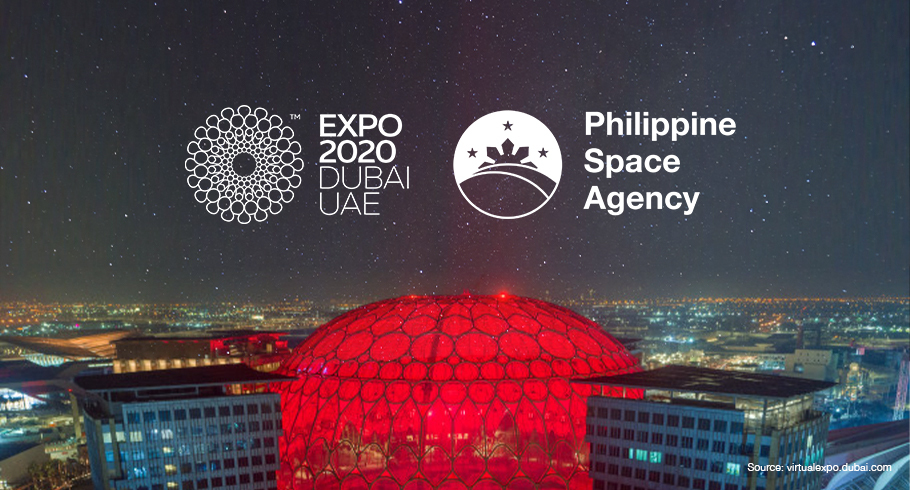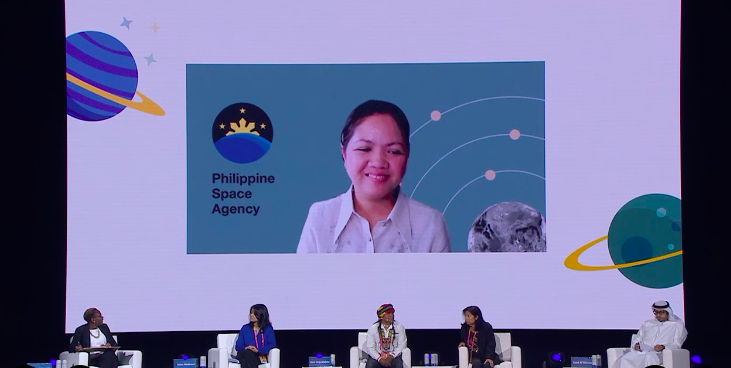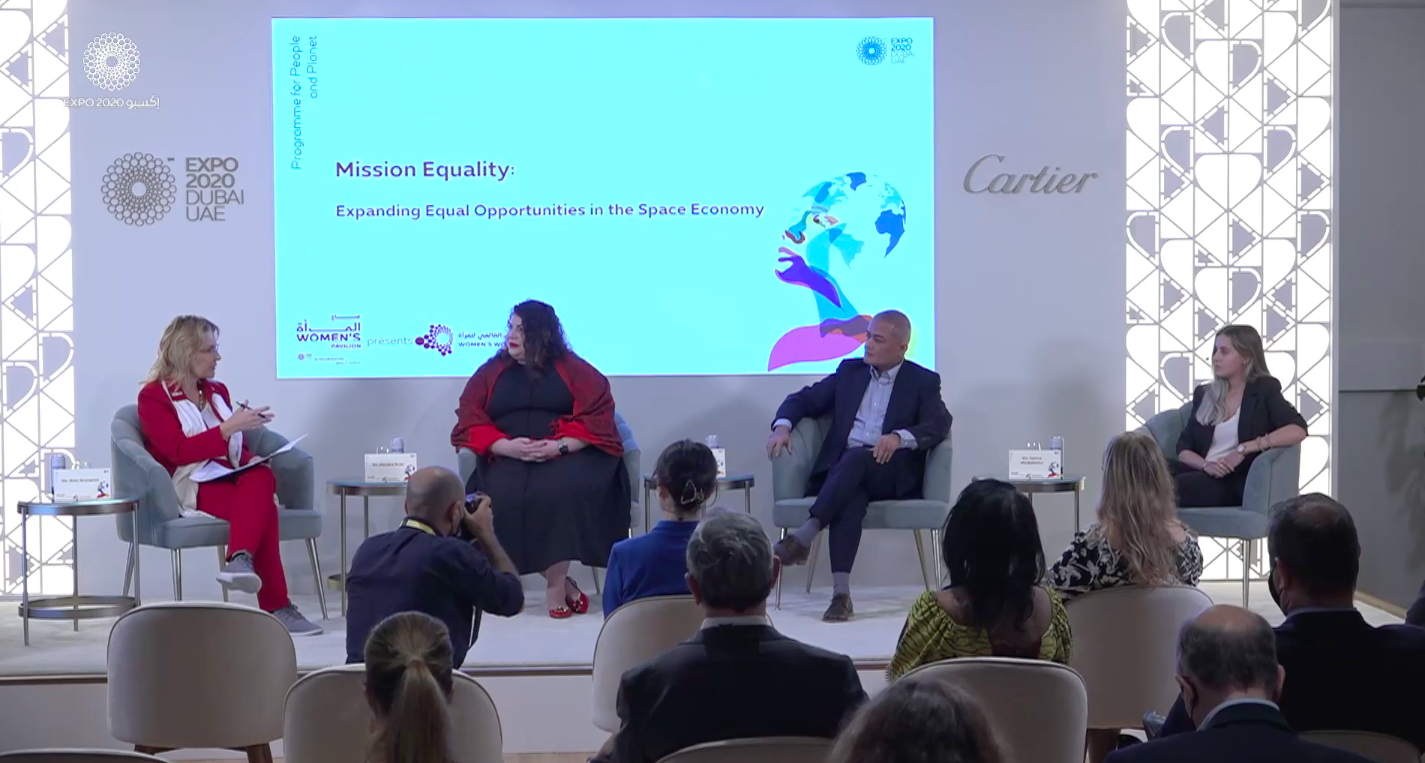(L-R) Moderator Shelli Brunswick (CEO, Space Foundation) with panelists Maruska Strah (Exec. Dir., World Space Week Association, Slovenia), Dr. Joel Joseph Marciano, Jr. (Director General, PhilSA), and Ksenia Moskalenko (CEO & co-founder, Mission Space, Latvia)
The Philippine Space Agency joins Expo 2020 Dubai Space Week led by Director General Dr. Joel Joseph S. Marciano, Jr., and Deputy Director General for Space Science and Technology Dr. Gay Jane P. Perez.
Creating value through diversity and access to opportunities
Director General Marciano represented the Philippines in a panel discussion held on 20 October at the Women’s Pavilion entitled “Mission Equality: Expanding Equal Opportunities in the Space Economy.” Panelists from the United Nations Office for Outer Space Affairs (UNOOSA), African Union Commission, Brazil, Japan, Latvia, Morocco, Slovakia, and the United Kingdom shared ideas and practices on how to ensure the full and equal participation of women in shaping the space market for public interest.
The conversation could not have been more timely because in 2018, global investment firm Morgan Stanley projected that the space industry will generate a revenue of $1 trillion by the year 2040. The space sector is now confronted with questions on how the growing opportunities and benefits in the space industry would reach the whole of humanity, especially women.
In her keynote message, State for Advanced Technology Minister and UAE Space Agency Chair H.E. Sarah Bint Yousif Al Amiri pointed out that the space sector thrives with innovation and it is for this reason that diversity is crucial.
“As policy makers…we need to ensure that we continuously drive change forward through policies, and through policies that we institutionalize not only at the international level but all the way down to institutional level to ensure that we’re providing equal opportunities,” H.E. Al Amiri said.
UNOOSA Director Simonetta Di Pippo noted that we still have a long way to go in closing the gender gap across sectors, with the Covid-19 pandemic eroding previous gains. This is despite efforts anchored on the Millennium and Sustainable Development Goals.
“The space industry is indicative of the slow pace of change. Women are still about a fifth of the space work force – 20-percent – a figure which is really at the same level since decades now. But, to improve life on Earth, to meet global challenges…we must ensure the equal participation of women in all fields,” Di Pippo said.
To address the gender gap in the sector, the UNOOSA has been running Space4Women, a program that supports and enables women and girls, particularly from developing nations, to access STEM education and opportunities in the space industry.
During the panel discussion, Director General Marciano echoed the importance of access to education and opportunities. The Philippines ranks 17th of 156 countries and 2nd in East Asia and Pacific region in terms of gender inclusivity according to the Global Gender Gap 2021 Report of the World Economic Forum. Dr. Marciano said, PhilSA intends to build on this and further promote gender inclusivity through the space sector.

Director General Marciano representing the Philippines in the “Mission Equality: Expanding Equal Opportunities in the Space Economy” panel discussion held on 20 October 2021 during the Expo 2020 Dubai
“One of the key development areas of the Philippine Space Agency is Space Education and Awareness, and that has to start at the grassroots. Education is important, but we need to reach the communities, we need to reach the villages, we need to reach the young girls and young women, their siblings, and their parents. That’s the foundation that we’re building on. So this inclusivity effort is pushed along in the Philippines because we now have Free Higher Education. That really opens doors of opportunity to many more Filipinos to get a higher education in Science and Technology. Now that we have the Philippine Space Agency, we have a real chance to build on this momentum,” Dr. Marciano said.
Expo 2020 Dubai is the first World Expo since 1900 to have a stand-alone pavilion dedicated to women, driven by the conviction that the global Sustainable Development Goals and aspirations for a peaceful and prosperous world cannot be achieved without gender equality and women empowerment. Celebrating the significant, but often forgotten, contributions of women, the pavilion hopes to demonstrate the principle that: “when women thrive, all of humanity thrives.”

PhilSA highlights need to make Earth Observation data accessible
In another Space Week event at the Expo held on 20 October, global leaders from space agencies, governments, and the private sector gathered together to develop an action-oriented cooperation plan to ensure that the benefits from humanity’s continued space activities will extend beyond space-faring nations.
“Space: Where the World Comes Together for Progress,” held panel discussions that tackled issues of sustainability, climate change, connectivity, education, Earth Observations, policies, strategies, and priorities from the perspective of international space industries and enterprises.
Deputy Director General for Space Science and Technology Dr. Perez, joining virtually from the Philippines, represented PhilSA in “Observations for Good” – a session that explored perspectives on how Earth Observation data can serve markets and communities around the world. To achieve this, Dr. Perez said, there is a need to address the challenges of satellite data accessibility for our end-users, such as farmers and fisherfolk: “We must address these hurdles by extending our efforts beyond the government. We need to involve different players as we need holistic solutions. No single sector can accomplish this alone, and so we need to engage various sectors. We need civic leaders, community leaders, non-governmental organizations, social workers, and the private sector in order to bridge this gap. The strength of these various groups lies in their motivation to understand the users and their culture, and know their needs. It is also at this point that I wish to highlight the value of international cooperation as a venue for exchanging technical know-how and capabilities and for sharing best practices.”

Dr. Perez virtually joins the moderator (L-R) Dr. Timiebi Aganaba and panelists Diana Mastracci (Space4Innovation, GEO Indigenous Alliance), Mario Vargas Shakaim (Shuar Federation of Pastaza), and Sultan bin Saeed al Mansouri (Chair, Dubai Center for the Development of Islamic Economy)
Aside from open access data and subscriptions, Dr. Perez said, PhilSA is determined to generate its own data products from its own satellites. PhilSA is looking at developing its next generation commercial grade satellites. Among these is the Multispectral Unit for Land Assessment or the MULA satellite. As a land assessment and environmental monitoring satellite, MULA is expected to generate valuable data for the agricultural sector.
The Expo 2020 Dubai Space Week being held from 17 to 23 October 2021 aims to probe the benefits, solutions, and challenges of exploring beyond our country’s orbit. It is organized in partnership with the United Arab Emirates Space Agency (UAESA) and the Mohammed Bin Rashid Space Center (MBRSC), and coincides with the International Astronautical Congress.
The week-long event is part of the UAE’s first ever World Expo that began on 01 October 2021 and will run until 31 March 2022. Also this year, the UAE celebrates its Golden Jubilee or 50th founding anniversary as a nation.
PhilSA to meet with Filipino community, international space agencies
From 25 October to 29 October, the Philippine Space Agency delegation consisting of Dr. Marciano, PhilSA Director for Space Policy and International Cooperation Atty. Noelle Riza D. Castillo, and Director for Space Technology Missions and Systems Bureau Dr. Marc Talampas will be participating in the 72nd International Astronautical Congress. Respective bilateral talks between the delegation and representatives of the UNOOSA, the UAE Space Agency (UAESA) and the Japan Aerospace Exploration Agency (JAXA) have been scheduled during the Congress.
The bilateral meeting that will be held between PhilSA and UNOOSA on 26 October will touch upon the projects to be undertaken under the landmark agreement between the two space agencies on the use of space data and technologies for sustainable socio-economic development that was signed in June 2021.
Dir. Castillo of PhilSA is also looking forward to discussing with UNOOSA the Space Law for New Space Actors Project: “The field of space law and policy is new in the country. We expect this field to grow and mature in the coming years with the implementation of the space programs of the Philippine Space Agency. Participation in UNOOSA’s Space Law for New Space Actors Project will enable PhilSA to benefit from the expertise of UNOOSA and learn from experiences of other nations who are more advanced in this field.”
PhilSA is also expected to meet with UAESA on 27 October following their virtual meeting last 19 August 2021. Both parties are looking into joint collaborations, especially in the downstream sector.
“We look forward to continuing our discussion with UAESA on potential joint activities related to satellite research and development and access to data. Both UAESA and PhilSA are aware of the value of data and how it enables applications for disaster management and emergency response, food security, and agriculture. We hope that a partnership with UAESA related to the development of downstream applications can be forged. We believe such a relationship to be highly beneficial to both parties,” Dir. Talampas said.
PhilSA will meet with JAXA on 27 October to discuss projects that can be undertaken under the Memorandum of Cooperation they signed in June this year.
On 29 October, the delegation will also meet with the Filipino community at the Philippine Pavilion (“Bangkóta”) at the Expo to introduce the Philippine Space Agency and the space program of the Philippines. The event will be hosted by the Philippine Embassy in the UAE in coordination with the Department of Trade and Industry (DTI).




